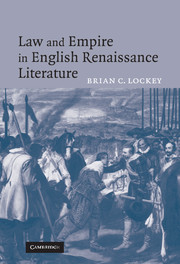Book contents
- Frontmatter
- Contents
- Acknowledgments
- Introduction: Romance and the ethics of expansion
- PART I ROMANCE AND LAW
- 1 Transnational justice and the genre of romance
- 2 Natural law and charitable intervention in Sir Philip Sidney's Old Arcadia
- 3 Natural law and corrupt lawyers: Riche, Roberts, Johnson, and Warner
- 4 Spenser's legalization of the Irish Conquest
- PART II THE PREROGATIVE COURTS AND THE CONQUEST WITHIN
- Conclusion: English law and the early modern romance
- Index
2 - Natural law and charitable intervention in Sir Philip Sidney's Old Arcadia
Published online by Cambridge University Press: 22 September 2009
- Frontmatter
- Contents
- Acknowledgments
- Introduction: Romance and the ethics of expansion
- PART I ROMANCE AND LAW
- 1 Transnational justice and the genre of romance
- 2 Natural law and charitable intervention in Sir Philip Sidney's Old Arcadia
- 3 Natural law and corrupt lawyers: Riche, Roberts, Johnson, and Warner
- 4 Spenser's legalization of the Irish Conquest
- PART II THE PREROGATIVE COURTS AND THE CONQUEST WITHIN
- Conclusion: English law and the early modern romance
- Index
Summary
Late sixteenth-century English perceptions of the Spanish policy in the Americas were based on the premise that the Spanish conquistadors were immoral perpetrators of cruelty and barbarism. This perception was shared by Sir Philip Sidney. The long correspondence between Sidney and his French tutor, Hubert Languet, reveals an ongoing preoccupation with the affairs of the Spanish and their exploits on the continent and in the New World. In particular, both Sidney and Languet wished England to be a more determined impediment to the Spanish policy of conquest and expansionism.
The question of how to commit England to such a role was complex. In the letters of Sidney and Languet, one detects a sustained unwillingness to meet Spanish aggression with a counterbalancing force of English aggression. Much of this unwillingness was simply the realistic fear of Spanish land-force dominance as well as the knowledge that the English queen would never commit wholeheartedly to the wars on the continent. Equally important, in my view, however, was the urge to imagine an “ethical” strategy of foreign engagement, one that would substitute the expansion of English influence on the continent for the Spanish strategy of territorial expansion. In his letters to Sidney, Languet warns of the necessity of the English to remain alert to the prospect of Spanish and French aggression. Instead of advising the English to respond with force, Languet urges a strategy that would strengthen English influence on the continent.
- Type
- Chapter
- Information
- Law and Empire in English Renaissance Literature , pp. 47 - 79Publisher: Cambridge University PressPrint publication year: 2006



